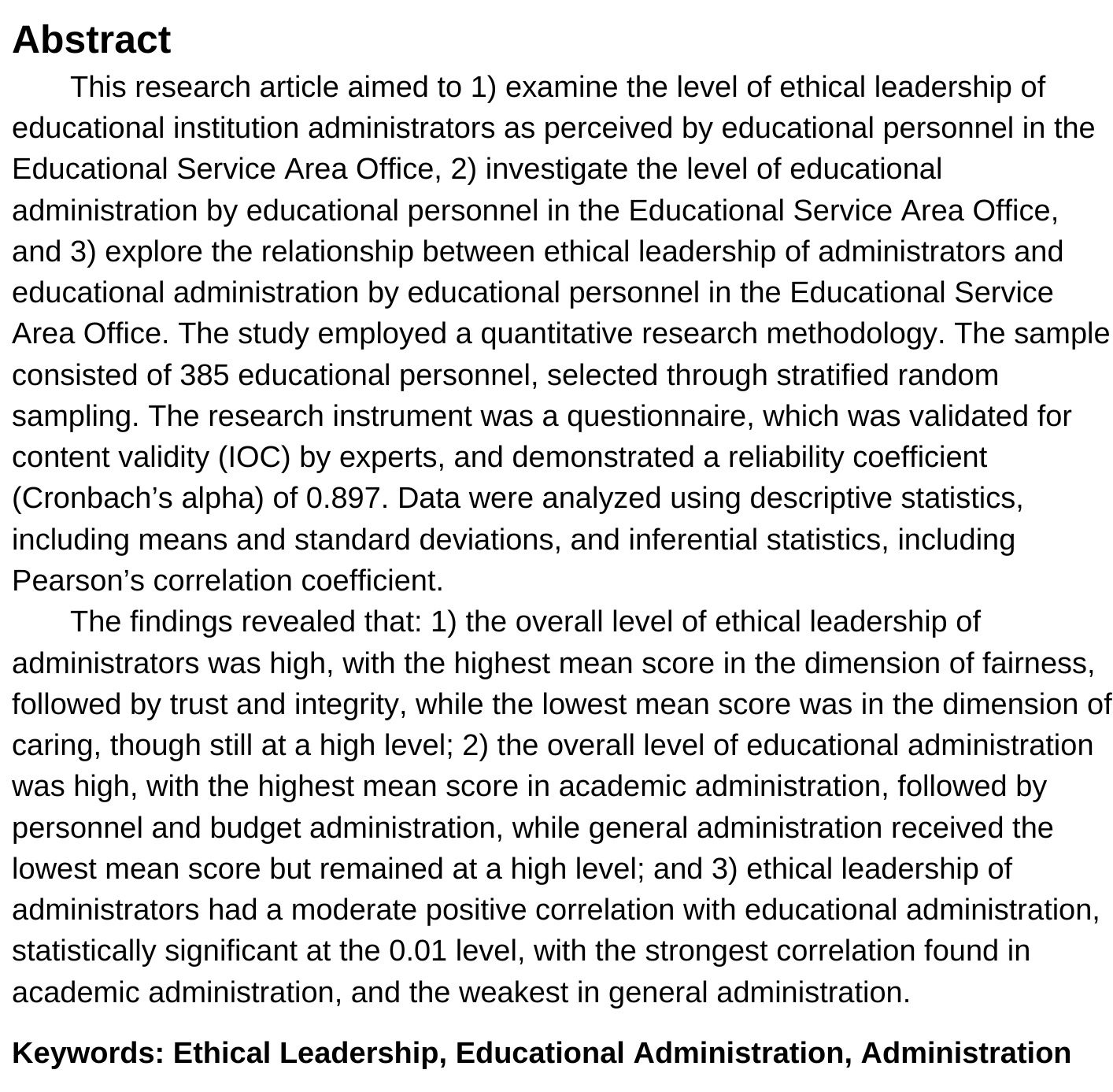Ethical leadership of administrators and educational administration of educational personnel Educational Service Area Office
Keywords:
Ethical Leadership, Educational Administration, AdministrationAbstract
This research article aimed to 1) examine the level of ethical leadership of educational institution administrators as perceived by educational personnel in the Educational Service Area Office, 2) investigate the level of educational administration by educational personnel in the Educational Service Area Office, and 3) explore the relationship between ethical leadership of administrators and educational administration by educational personnel in the Educational Service Area Office. The study employed a quantitative research methodology. The sample consisted of 385 educational personnel, selected through stratified random sampling. The research instrument was a questionnaire, which was validated for content validity (IOC) by experts, and demonstrated a reliability coefficient (Cronbach’s alpha) of 0.897. Data were analyzed using descriptive statistics, including means and standard deviations, and inferential statistics, including Pearson’s correlation coefficient.
The findings revealed that: 1) the overall level of ethical leadership of administrators was high, with the highest mean score in the dimension of fairness, followed by trust and integrity, while the lowest mean score was in the dimension of caring, though still at a high level; 2) the overall level of educational administration was high, with the highest mean score in academic administration, followed by personnel and budget administration, while general administration received the lowest mean score but remained at a high level; and 3) ethical leadership of administrators had a moderate positive correlation with educational administration, statistically significant at the 0.01 level, with the strongest correlation found in academic administration, and the weakest in general administration.
References
กมลชนก ราชสง. (2565). ภาวะผู้นำเชิงจริยธรรมของผู้บริหารสถานศึกษาสังกัดสำนักงานเขตพื้นที่การศึกษาประถมศึกษาสุราษฎร์ธานี เขต 3. สารนิพนธ์ศึกษาศาสตรมหาบัณฑิต. บัณฑิตวิทยาลัย : มหาวิทยาลัยหาดใหญ่.
ธีรพัฒน์ เพชรศรีจันทร์ และ พิชญาภา ยืนยาว (2562). ภาวะผู้นำเชิงจริยธรรมของผู้บริหารสถานศึกษาที่ส่งผลต่อความผูกพันต่อองค์การของข้าราชการครูโรงเรียนประถมศึกษาของรัฐในจังหวัดอุทัยธานี. วารสารมหาจุฬานาครทรรศน์, 6(5), 2233-2250.
นพรัตน์ อิสระณรงค์พันธ์. (2565). ภาวะผู้นำเชิงจริยธรรมของผู้บริหารสถานศึกษาสังกัดสำนักงานเขตพื้นที่การศึกษาประถมศึกษาเชียงราย เขต 2. วิทยานิพนธ์ปริญญาการศึกษามหาบัณฑิต สาขาวิชาการบริหารการศึกษา : มหาวิทยาลัยพะเยา.
บรรณรฐา ทองสุบรรณ. (2563). การบริหารแบบมีส่วนร่วมในงานวิชาการของบุคลากรทางการศึกษาโรงเรียนชุมชนบ้านทะเลทรัพย์ สำนักงานเขตพื้นที่การศึกษาประถมศึกษา ชุมพร เขต 1,หลักสูตรศึกษาศาสตรมหาบัณฑิต สาขาวิชาการบริหารการศึกษา : วิทยาลัยทองสุข.
เพ็ญโฉม โพธิจักร. (2564). การมีส่วนร่วมในการบริหารงานสถานศึกษาของชุมชน โรงเรียนชุมชนบ้านขวาว อำเภอเสลภูมิ จังหวัดร้อยเอ็ด. วิทยานิพนธ์ ศึกษาศาสตร์มหาบัณฑิต สาขาวิชาการบริหารการศึกษา : วิทยาลัยทองสุข.
ภารดี อนันต์นาวี. (2551). หลักการ แนวคิด ทฤษฎี ทางการบริหารการศกษา. ชลบุรี : สานักพิมพ์. มนตรี จำกัด.
วันเฉลิม รูปสูง, พิชญาภา ยืนยาว และ ธีรวุธ ธาดาตันติโชค. (2564). ภาวะผู้นำเชิงจริยธรรมของผู้บริหารสถานศึกษาที่ส่งผลต่อคุณภาพชีวิตในการทำงานของครูสังกัดสำนักงานเขตพื้นที่การศึกษาประถมศึกษาสุพรรณบุรีเขต 2. วารสารสิรินธรปริทรรศน์, 22(1), 37-50.
วิโรจน์ สารรัตนะ. (2557). แนวคิด ทฤษฎีและประเด็นเพื่อการบริหารทางการศึกษา. กรุงเทพฯ : สํานักพิมพ์. ซีเอ็ดบุ๊คเซ็นเตอร์.
ศุภรัตน์ ปุ้งข้อ. (2558). สภาพการบริหารงานความสัมพันธ์ระหว่างโรงเรียนกับชุมชนของโรงเรียนขยายโอกาสทางการศึกษาในกลุ่มเครือข่ายเขาฉกรรจ์ สังกัดสำนักงานเขตพื้นที่การศึกษาประถมศึกษาสระแก้ว เขต 1. วิทยานิพนธ์ศึกษาศาสตรมหาบัณฑิต : มหาวิทยาลัยบูรพา.
สำนักงานคณะกรรมการการศึกษาขั้นพื้นฐาน. (2562). คู่มือแนวทางการจัดการการเรียนการสอน.กรุงเทพฯ : โรงพิมพ์คุรุสภา.
เสาวลักษณ์ แก้วแกมจันทร์. (2565). ภาวะผู้นำเชิงจริยธรรมของผู้บริหารสถานศึกษาที่ส่งผลต่อคุณลักษณะอันพึงประสงค์ของนักเรียนในสถานศึกษาสังกัดสำนักงานเขตพื้นที่การศึกษามัธยมศึกษานครศรีธรรมราช. วิทยานิพนธ์ครุศาสตรมหาบัณฑิต สาขาวิชาพุทธบริหารการศึกษา. บัณฑิตวิทยาลัย : มหาวิทยาลัยจุฬาลงกรณราชวิทยาลัย.
Brown, M. E., Treviño, L. K., & Harrison, D. A. (2005). Ethical leadership: A social learning perspective for construct development and testing. Organizational Behavior and Human Decision Processes, 97(2), 117–134.
Cronbach, Lee J. (1990). Essentials of Psychological Testing. 5 th ed. New York : Harper Collins Publishers, Inc.
Krejcie, R.V. and Morgan, D.W. (1970). Determining Sample Size for Research Activities. Educational and Psychological Measurement, 30(3), 607–610.
Likert, R. (1967). The Method of Constructing and Attitude Scale. In Reading in Fishbeic, M (Ed.), Attitude Theory and Measurement. New York : Wiley and Son.

Downloads
Published
How to Cite
Issue
Section
License
Copyright (c) 2025 Institute of Sufficiency Journal

This work is licensed under a Creative Commons Attribution-NonCommercial-NoDerivatives 4.0 International License.



